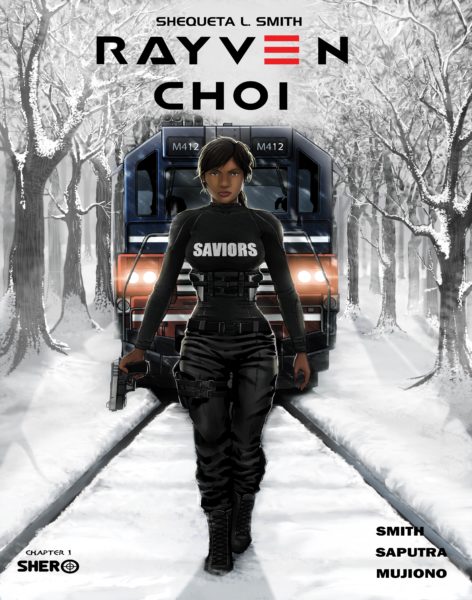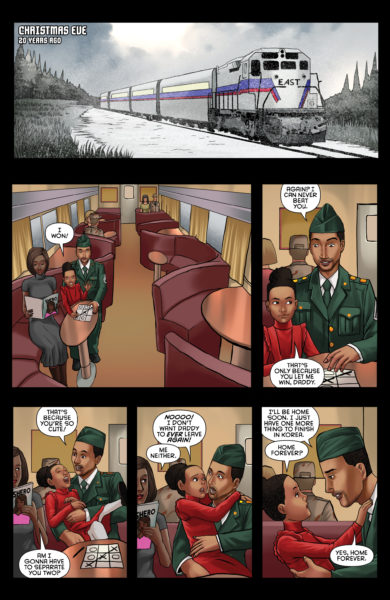
I’m going to let you behind-the-scenes here at 8Asians: Publishers who have any content featuring Asians usually approach the site looking for some publicity with the APIA audience. The requests are then sent out on our internal email list, I usually see them and almost all of them don’t interest me.
However, when I saw the words, “graphic novel,” and “strong African American heroine” I wanted to give it a read. And I’m thankful that I did. But before I get into a review, let me rant a little and explain why Rayven Choi by award-winning writer/creator Shequeta L. Smith is such a breath of fresh air.
A few years ago, my friend and producing partner—the prolific filmmaker Quentin Lee—made a comment that has stuck with me all these years later. He told me—and I’m loosely quoting here—that “ethnic” films and stories usually are only two races: the race of the filmmakers/creators and Caucasians.
It wasn’t until he said it that I began noticing it. In Asian American films, usually the prominent characters were Asian but all the other characters tended to be Caucasian. This isn’t to say that all APIA movies were like this, but a vast majority seemed to be. And the crazy thing was that it was the same for African American and Latino films as well.
In the past, I’ve been guilty of this too. We—as people of color who create—push so hard for our stories to be heard by society at large, our struggles become “us” versus “them,” with “them” being Caucasians. And when we fight so hard to be heard we sometimes forget about the “others,” who like us, struggle to be heard.
This is why in my own writing, I try to keep what Quentin said in mind. I try to make sure there is a diverse representation of people in my stories—not just to be diverse for the sake of diversity but to reflect the society I see.
Enough of my rant. Let me get into Rayven Choi. Here’s the Amazon synopsis:
In Korea, orphan Rayven Choi has had 20 years to feel bitter about the hitman who brutally murdered her parents in cold blood. Now, she is back in America and she is on a mission. She is a bounty hunter with a score to settle. She is looking for revenge.
Here is a sample page from the graphic novel:

To be fair, I was only given chapter one (the first e-book) to read, so I can’t speak on the whole series itself. But from what I did read, I found it fast paced, with great art, and an interesting story that left me wanting more.
It was also refreshing to read a story that not only had a diverse lead, but also a diverse set of characters around the lead. Personally, I found it especially refreshing that the Asian people in the story weren’t all bad.
Because I enjoyed the book so much, I wanted to find out more. So I was able to ask the creator/writer Shequeta Smith a few questions about her graphic novel:
Why did you decide to set the story in Korea?
I first wrote the screenplay for Rayven Choi back in 2002-2003, a few years after I went on a study abroad trip to Seoul. Visiting South Korea gave me a new set of eyes because it was so unique and rich with culture and the people treated me like family. I actually considered going back to teach English there until 9-11 happened. After that, I just went into writing mode and before I knew it I had the first draft of Rayven Choi.
Why do you think it’s important for a creator like yourself to create not only a diverse lead but a diverse world as well?
I believe that it’s a creator’s responsibility to be authentic to the world that they create. For me, that authenticity comes from me holding up a mirror to the world and then reflecting what I see in my art. Growing up in the melting pot that is America, I don’t understand why there are so many projects that don’t reflect how diverse we are. This is going to sound kind of silly but just think of how boring a Sci-Fi movie like “Men in Black” would be if all of the aliens were identical. Diversity makes everything a little more interesting and I believe that being interesting should be the number one goal for a creator.
Rayven Choi is available on Amazon Kindle, Barnes & Noble Nook and iTunes/iBook formats. And it’s available in Korean as well.
A film based on the graphic novel is set to be screened at film festivals later in the year. Be sure to check out the trailer. And if you’re interested in keeping in touch with the progress of the book or movie, go to the Facebook and/or Twitter pages.
Follow me at @ksakai1.








